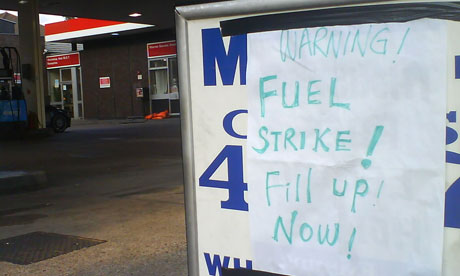
A second wave of fuel strikes by Shell petrol tanker drivers has been planned for next week, theguardian.com has revealed.
Ron Webb, a chief negotiator for the Unite union, said there would be "more industrial action" next week unless the pay dispute is settled.
Four days – from Friday to Monday - have been ring-fenced for a second round of strikes, he said. "That's going ahead. There'll be no resolution of this dispute until we reach a pay settlement."
Two industry sources confirmed they have been told by the union to expect a second bout of strikes. Until now, the oil industry had only expected four days of strikes.
The disclosure means that Britain could face almost a fortnight of fuel strikes, with just a three day window of reprieve for Shell to refill its stations.
Petrol stations began running out of fuel this morning as the four-day strike sparked a wave of panic buying among motorists and the effects began to spread to other fuel companies.
Several Shell garages in the south of England predicted they would run dry within hours because of the strike affecting two companies that deliver to more than 900 Shell stations - around a 10th of petrol stations around the UK.
Some tanker drivers with other companies refused to cross picket lines at depots, leading to fears of more widespread shortages. The government called for drivers to be calm.
The stoppage by drivers working for Hoyer UK and Suckling Transport began at 6am after pay talks broke down last night. The Unite union says wages have not increased since 1992.
At 6.50am, two tankers from the Watson company pulled up outside Shell's Stanlow oil refinery in Ellesmere Port, Cheshire, but turned around and left, to cheers and claps from the dozens of striking drivers picketing the gates.
All 150 drivers on Shell contracts at Stanlow were on strike, Unite said. Picketing would remain in place until the stoppage ended on Tuesday morning.
Unite said drivers from other firms, including those on contracts for BP, had refused to cross picket lines.
Other pickets were in place at the Shell depots of Avonmouth near Bristol, Plymouth, Pembroke, South Wales, Cardiff, Kingsbury, Staffordshire, Basildon, Essex, Grangemouth, Stirlingshire, Aberdeen, Inverness, Jarrow, South Tyneside, and Luton airport.
Union officials in Plymouth said drivers contracted to every oil company had supported the action, and garages in Devon and Cornwall – which rely on two Plymouth depots for almost all their supplies – would run out of fuel soon.
"By late tonight or at the latest early tomorrow we will run dry," said Richard Burrows, a shop steward for Unite.
Sil Damhayan, who works at a Shell garage in Hove, East Sussex, said three days of panic buying meant stocks would run out "in the next two to three hours". An employee at another Shell outlet in nearby Brighton said supplies would last until the end of the day at most.
Gordon Brown said it was "extremely disappointing" that the talks had collapsed.
"We have been working very closely with the industry to put in place a contingency plan to reduce, as far as possible, and minimise disruption to the public," he said.
"We would strongly urge the parties of this dispute to return to the negotiating table as soon as possible."
Unite says the tanker drivers are paid the same now as in 1992 - just under £32,000 a year - despite longer hours. Shell claims average pay is more than £36,000 and would have increased to around £39,000 under an offer rejected by the union.
The union says haulage firms are offering an effective pay increase of only 0.5% and blames Shell for not intervening. The oil company, which is not directly involved in discussions, has called for both sides to keep talking.
Tony Woodley, the joint general secretary of Unite, who joined the picket at Stanlow depot, said this morning that it would carry on "until Shell comes to the table".
Memories of the panic buying and fuel rationing that followed blockades of oil distribution depots in 2000 may have fuelled fears of pumps running dry again.
Meanwhile, police warned motorists to avoid the M6 in north-west England tomorrow due to a planned go-slow protest by other truck drivers over high fuel prices.
Around 100 lorries are expected to leave the Lymm truck stop in Cheshire at 9am and drive at 40mph to junction 35 at Carnforth, Lancashire, before taking the same route back south.
The government has drawn up plans allowing suppliers to share information about stocks without breaking competition laws. Fuel supplies to the emergency services will be maintained.
There have been protests over the price of fuel across the world. Yesterday in the Philippines, hundreds of lorries and minibuses blocked roads leading to the presidential palace, in protest at 14 price rises in less than six months.

